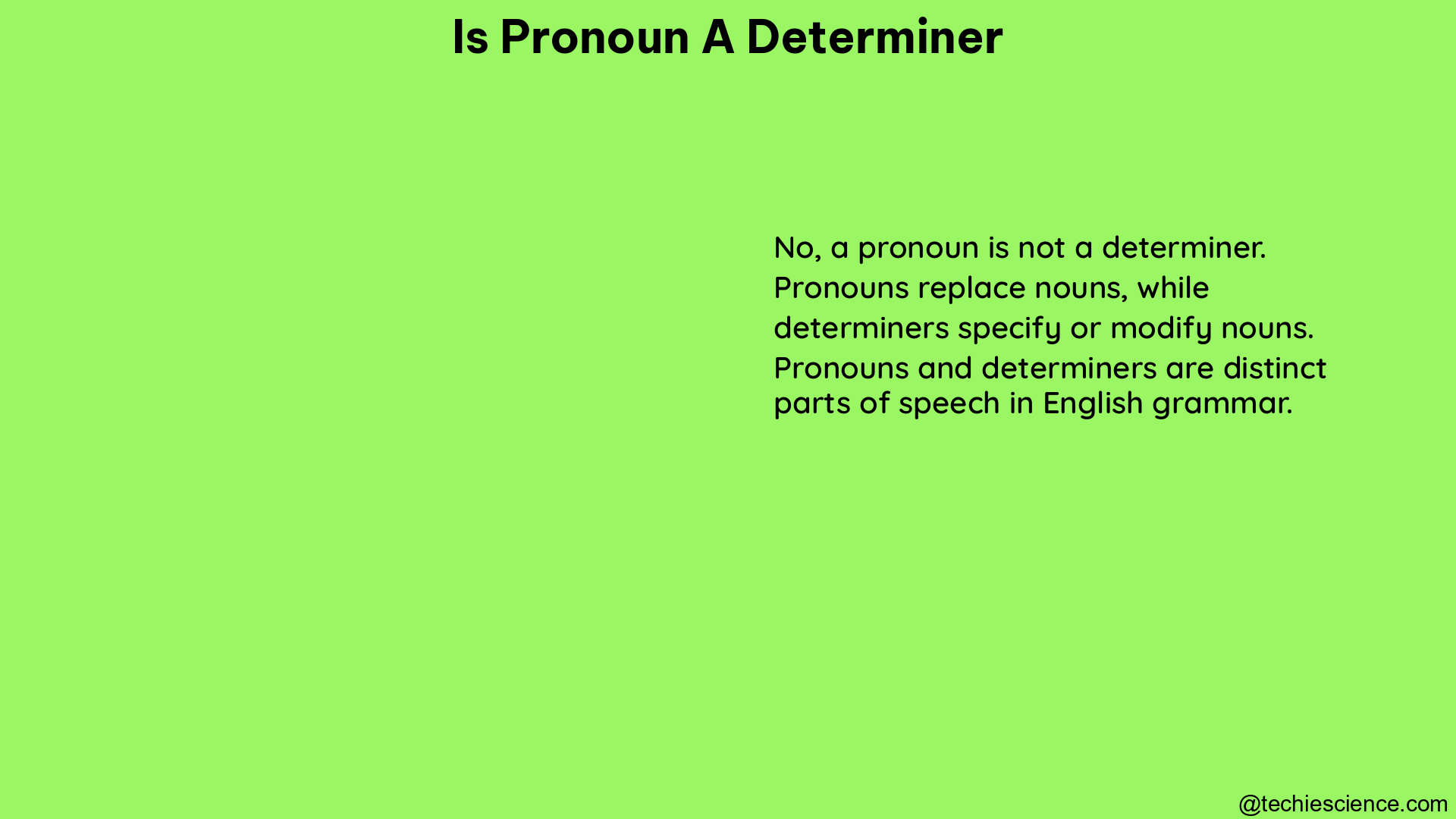No, a pronoun is not a determiner. While both pronouns and determiners are used to refer to nouns, they serve different functions and have distinct grammatical specifications.
Key Differences
1. Function
- Pronouns: Replace nouns or noun phrases, functioning as independent entities in a sentence. They can be subjects, objects, or complements of verbs.
- Determiners: Modify nouns, indicating which specific thing or group of things is being referred to. They always come before a noun or noun phrase.
2. Usage
- Pronouns: Can stand alone or replace a noun phrase, whereas determiners cannot exist independently.
- Determiners: Always precede a noun, qualifying or specifying it in some way.
3. Examples
- Pronouns:
- “He is going to the store.” (Here, “he” is a pronoun replacing a noun.)
- “Several managed to escape.” (Here, “several” is a pronoun referring to an unspecified number of people.)
- Determiners:
- “The dog is barking.” (Here, “the” is a determiner specifying which dog.)
- “Both men were given life sentences.” (Here, “both” is a determiner indicating which men.)
Advanced Details and Theoretical Explanation

Partitives
Some pronouns, especially those referring to amounts or quantities, can be used like partitives with “of” and a noun phrase or personal pronoun, making them similar to determiners. For example, “Some of the apples” or “Some of them”.
Overlapping Forms
Many determiners and pronouns share the same form, making it essential to understand their context and function to distinguish between them. For instance, “this” can be a demonstrative pronoun (e.g., “This is my book.”) or a demonstrative determiner (e.g., “This book is mine.”).
Examples Specific to “Is Pronoun a Determiner?”
Pronoun
“Both were given life sentences.” (Here, “both” is a pronoun referring to an unspecified number of people.)
Determiner
“Both men were given life sentences.” (Here, “both” is a determiner specifying which men.)
Grammatical Specifics
Pronoun
Pronouns are a closed class of words that can replace nouns or noun phrases in a sentence. They can function as subjects, objects, or complements of verbs. Pronouns can be personal (e.g., “I,” “you,” “he”), demonstrative (e.g., “this,” “that”), indefinite (e.g., “some,” “any”), relative (e.g., “who,” “which”), or interrogative (e.g., “who,” “what”).
Determiner
Determiners are a class of words that precede and modify nouns, specifying the reference of the noun. They can be definite (e.g., “the”), indefinite (e.g., “a,” “an”), possessive (e.g., “my,” “your”), demonstrative (e.g., “this,” “that”), or quantifying (e.g., “some,” “many”). Determiners are essential in providing context and specificity to the noun they modify.
Differences in Grammatical Functions
The key difference between pronouns and determiners is that pronouns can function as independent entities in a sentence, whereas determiners always modify a noun or noun phrase. Pronouns can be the subject, object, or complement of a verb, while determiners cannot stand alone and must always precede a noun.
Conclusion
In summary, while pronouns and determiners may share some overlapping forms, they serve distinct grammatical functions. Pronouns replace nouns or noun phrases, while determiners modify nouns, indicating the specific reference or quantity being referred to. Understanding the differences between these two parts of speech is crucial for effective communication and proper English grammar usage.
Reference:
- https://www.ucl.ac.uk/internet-grammar/determin/pronoun.htm
- https://grammar.collinsdictionary.com/us/easy-learning/how-do-you-know-if-a-word-is-being-used-as-a-pronoun-or-a-determiner
- https://dictionary.cambridge.org/us/grammar/british-grammar/nouns-pronouns-and-determiners

Hi…..I’m a graduate with a Bachelor’s degree in English Literature. I wish to do a Masters in the same field someday and continue my career in Academia.
Let’s connect through LinkedIn: